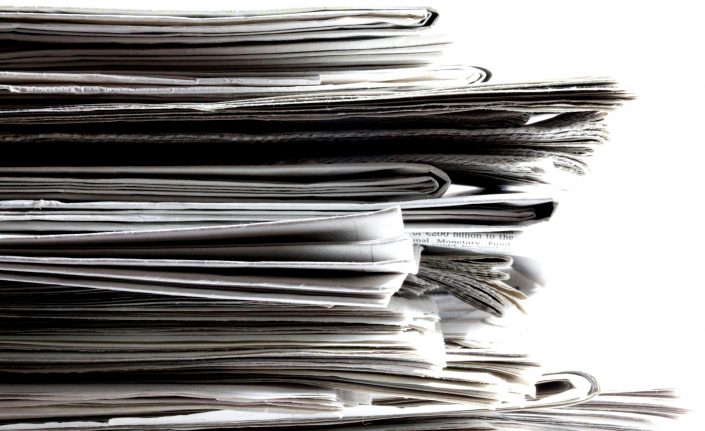Some thoughts on print newspapers

When people who otherwise know me and Wendy very well come round to our house, they not infrequently express surprise at newspapers lying around the place. But, whatever others might think, both Wendy and I like a print newspaper. For both of us, the serendipity of newsprint is inspiring: we often find our views challenged by a newspaper presenting something that we hadn’t previously considered, or highlighting an alternative angle on something we thought we knew. This is the newspaper playing the role of an anti-Facebook: not presenting us with stuff we are likely to like, but instead presenting us with stuff which is well outside our field of knowledge and experience.
On top of this, there happens to be a large overlap in the Venn diagram of good journalists and journalists employed by print news organisations. So as well as reading print newspapers, I also subscribe to a number of digital versions of newspapers from the UK and the USA, often to follow specific journalists. There are some journalists whose byline on an article means it’s worth reading, even if it’s about something I would never normally be interested in: Will Storr is an example. There are some journalists who are so expert and well-connected in their field that their byline means an article will provide new insight into a topic: Tim Shipman is an example. There are some journalists who understand the value of explaining the significance of a story, don’t cry wolf, and aren’t afraid to explain that the frontpage splash is really not a big deal in the grand scheme of things: Matt Chorley is an example. And, at the other end of the spectrum, one quickly gets to know the bylines to avoid, the journalists who will almost certainly have failed to understand the material they are covered, whose work will almost inevitably contain at least one major error of fact: it seems rude to give an example.
Another advantage of traditional print is that it is slow. Breaking news frequently demands our attention but is rarely worthy of it. The implications of news are rarely understood at the moment it breaks, not least as so little is generally known. Speculation is often worse than unhelpful, separating fact from fiction is rarely possible in the moment, and vacuous commentary often precedes facts. Farhad Manjoo’s article for the New York Times this week discussed relying solely on print newspapers for news and was particularly clear on this. Delayed Gratification is even better than newspapers for this: it presents news on a three-month delay, allowing much fuller analysis and discussion than anyone could hope to achieve in the first three minutes.
Of course, both me and Wendy also regularly read news online and on our phones. We don’t exclusively read newspapers. But I think, for both of us, they form an important part of our news ‘diet’.
I was set thinking about all of this after seeing a data story by Kirby Swales in April’s Prospect. Swales’s suggestion is that the BBC News website has essentially cannibalised the tabloid newspaper market (perhaps the reason the BBC feels it necessary to write full articles on a reality star’s Instagram post and ‘listicles’ about Twitter storms). To me, the biggest surprise in that data is that less than half the adult population of the UK regularly reads news online.
I don’t really have a point to make in this post. I suppose I’m just musing without conclusion that I like newspapers, their circulation is falling, and with ever-more news available online, the proportion of people engaging with it is really quite small. Maybe society is disengaging from journalism. Or maybe habits are changing in less dramatic ways. I don’t know.
The picture at the top is from Jeff Eaton on Flickr and is used here under Creative Commons licence.
This post was filed under: News and Comment, Posts delayed by 12 months, Delayed Gratification, Farhad Manjoo, Kirby Swales, Matt Chorley, Media, Newspapers, Prospect, The New York Times, Tim Shipman, Will Storr.